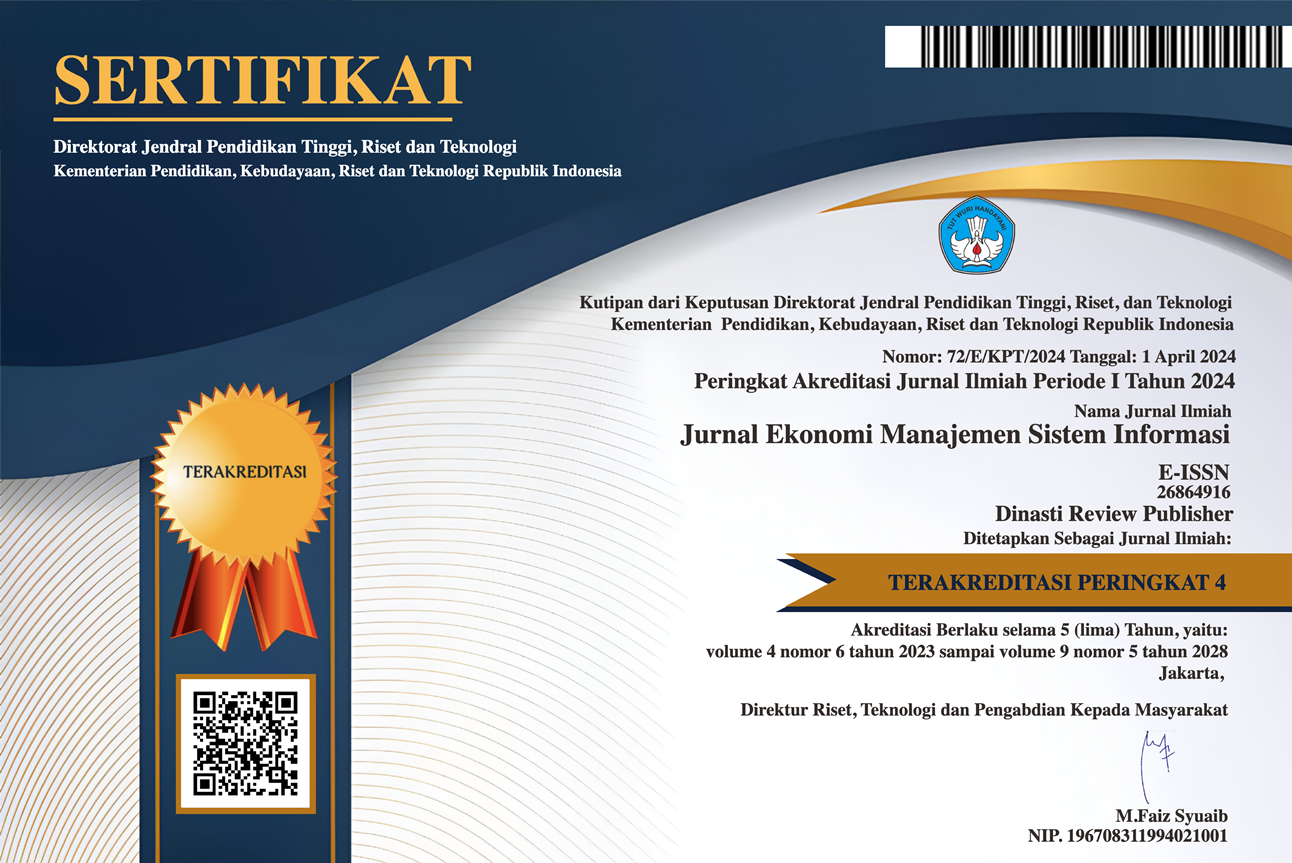Pengaruh Organizational Culture, Humble Leadership dan Knowledge Management Pada Employee Performance: Job Satisfaction Sebagai Intervening
DOI:
https://doi.org/10.38035/jemsi.v6i4.4683Keywords:
Employee Performance, Organizational Culture, Humble Leadership, Knowledge Management, Job SatisfactionAbstract
Persaingan bisnis yang semakin ketat menuntut organisasi untuk terus meningkatkan employee performance, yang menjadi kunci keberhasilan. Permasalahan yang sering dihadapi adalah kurang optimalnya penerapan organizational culture, humble leadership, dan knowledge management, yang berpengaruh terhadap employee performance. Penelitian ini bertujuan untuk menganalisis pengaruh organizational culture, humble leadership, dan knowledge management terhadap employee performance dengan job satisfaction sebagai variabel mediasi. Penelitian menggunakan metode survei kuantitatif dengan kuesioner online yang diisi oleh 135 manajer menengah dari berbagai divisi di lima perusahaan konstruksi besar di Jakarta. Data dianalisis menggunakan Partial Least Squares (PLS-SEM). Hasil penelitian menunjukkan bahwa organizational culture, humble leadership, dan knowledge management secara signifikan memengaruhi job satisfaction dan Employee performance. Penelitian ini menyarankan perusahaan untuk memperkuat organizational culture, menerapkan humble leadership, dan meningkatkan knowledge management guna meningkatkan job satisfaction dan employee performance. Penelitian selanjutnya disarankan untuk memperdalam pengaruh humble leadership terhadap employee performance serta memperluas peran organizational culture dan knowledge management, dengan fokus pada inovasi, keterbukaan, dan teknologi dalam pengelolaan pengetahuan. Penelitian ini berkontribusi pada peningkatan pemahaman tentang pentingnya organizational culture, humble leadership, dan knowledge management yang efektif dalam memperkuat job satisfaction dan employee performance di industri konstruksi.
References
Almuayad, K. M. A., & Chen, Y. (2024). Effect of Knowledge Management on Employee Job Performance in Yemeni Banking Sector: The Mediating Role of Job Satisfaction. Dalam Journal of the Knowledge Economy (Nomor February). https://doi.org/10.1007/s13132-024-01791-6
Alrazehi, H. A. A.-W., Amirah, N. A., Emam, A. S. M., & Hashmi, A. R. (2021). Proposed Model for Entrepreneurship, Organizational Culture and Job Satisfaction towards Organizational Performance in International Bank of Yemen. International Journal of Management and Human Science (IJMHS), 5(1), 2590–3748.
Amayreh, Dr. K. T. (2023). The Role of Organizational Culture on the Relationship between Knowledge Management and Employee Performance in Jordan. International Journal of Academic Research in Accounting, Finance and Management Sciences, 13(3), 597–607. https://doi.org/10.6007/ijarafms/v13-i3/19389
Ansong, A., Owusu, S. A., Ansong, L. O., & Andoh, R. P. K. (2024). Leader humility and organisational citizenship behaviour: The mediating roles of job satisfaction and employee engagement. Cogent Business and Management, 11(1). https://doi.org/10.1080/23311975.2024.2358166
Azmy, A., Hartono, D. K., & Mirza, M. (2023). The Effect of Organizational Transformation, Organizational Culture, and Transformational Leadership on Employee Performance Through Job Satisfaction: An Evidence from Automotive Component Manufacturing Companies. Management, 27(1), 95–129. https://doi.org/10.58691/man/170437
Brunetto, Y., Teo, S. T. T., Shacklock, K., & Farr-Wharton, R. (2022). Emotional intelligence, job satisfaction, well-being and engagement: Explaining organisational commitment and turnover intentions in policing. Human Resource Management Journal, 22(4), 428–441. https://doi.org/10.1111/j.1748-8583.2012.00198.x
Candra, A., Sudiro, A., & Susilowati, C. (2023). The relationship between work professionalism and job satisfaction toward employee performance in mediating of organizational climate. International Journal of Research in Business and Social Science (2147- 4478), 12(2), 177–186. https://doi.org/10.20525/ijrbs.v12i2.2380
Carrière, J., & Bourque, C. (2019). The effects of organizational communication on job satisfaction and organizational commitment in a land ambulance service and the mediating role of communication satisfaction. Career Development International, 14(1), 29–49. https://doi.org/10.1108/13620430910933565
Chayomchai, A. (2020). Leadership and organizational structure affecting employees’ behaviors: A study on job satisfaction, work engagement, and organizational citizenship behavior of Y-generation Thais. International Journal of Management, 11(4), 44–53. https://doi.org/10.34218/IJM.11.4.2020.006
Chi, H., Vu, T., Nguyen, H. V., & Truong, T. H. (2023). How financial and non–financial rewards moderate the relationships between transformational leadership, job satisfaction, and job performance. Cogent Business and Management, 10(1), 1–19. https://doi.org/10.1080/23311975.2023.2173850
Chien, G. C. L., Mao, I., Nergui, E., & Chang, W. (2020). The effect of work motivation on employee performance: Empirical evidence from 4-star hotels in Mongolia. Journal of Human Resources in Hospitality and Tourism, 19(4), 473–495. https://doi.org/10.1080/15332845.2020.1763766
Cubukcu, K., & Tarakcioglu, S. (2020). The Relation between Organ?zat?onal Trust and Organ?zat?onal Comm?tment: A Study on Teachers of Hotel Management and Tourism Vocational High Schools. 4, 57–78.
Davis, E. B., Barneche, K., Aten, J. D., Shannonhouse, L. R., Wang, D. C., Van Tongeren, D. R., Davis, D. E., Hook, J. N., Chen, Z. J., Lefevor, G. T., McElroy-Heltzel, S. E., Elick, E. L., Van Grinsven, L., Lacey, E. K., Brandys, T. R., Sarpong, P. K., Osteen, S. A., & Shepardson, K. (2023). The multilevel correlates, contributions, and consequences of leader humility in humanitarian aid work. Frontiers in Psychology, 14(December). https://doi.org/10.3389/fpsyg.2023.1188109
Diwanti, S. A., Elmi, F., & Rimawan, E. (2021). The Influence of Talent Management and Knowledge Management on Employee Performance with Employee Engagement as Intervening Variable (Case Study on Employees of Banten Regional Tax Office). Review of International Geographical Education Online, 11(7), 1095–1103. https://doi.org/10.48047/rigeo.11.07.103
Dlamini, P. N. T., & Mhandu, J. (2024). An Investigation into the Effectiveness of the Current Performance Appraisal System and Its Contribution to Employee Performance for National Health Laboratory Services Employees at Amajuba-Mzinyathi and Umkhanya-Zulu Business Units, Kwazulu-Natal Region. African Journal of Development Studies (formerly AFFRIKA Journal of Politics, Economics and Society), 14(1), 151–182. https://doi.org/10.31920/2634-3649/2024/v14n1a8
Driks, K., & Ferrin, D. (2019). The Role of Trust in Organizational Settings. 467, 1–23.
Eliyana, A., Ma’arif, S., & Muzakki. (2019). Job satisfaction and organizational commitment effect in the transformational leadership towards employee performance. European Research on Management and Business Economics, 25(3), 144–150. https://doi.org/10.1016/j.iedeen.2019.05.001
Fithriyana, I., Maria, S., & Hidayati, T. (2022). The Relationship between Employee Satisfaction and Employee Performance mediated by Employee Engagement. Frontiers in Business and Economics, 1(3), 147–153. https://doi.org/10.56225/finbe.v1i3.120
Gorondutse, A. H., & Hilman, H. (2019). Does organizational culture matter in the relationship between trust and SMEs performance. Management Decision, 57(7), 1638–1658. https://doi.org/10.1108/MD-05-2018-0557
Hair, J. F., Risher, J. J., Sarstedt, M., & Ringle, C. M. (2019). When to use and how to report the results of PLS-SEM. European Business Review, 31(1), 2–24. https://doi.org/10.1108/EBR-11-2018-0203
Hasballah, M. A. (2021). The influence of knowledge management on lecturer performance through job satisfaction. Management Science Letters, 11, 959–964. https://doi.org/10.5267/j.msl.2020.10.001
Henseler, J., Ringle, C. M., & Sinkovics, R. R. (2009). The use of partial least squares path modeling in international marketing. Advances in International Marketing, 20(2009), 277–319. https://doi.org/10.1108/S1474-7979(2009)0000020014
Jufrizen, Farisi, S., Hasibuan, J. S., & Gunawan, A. (2024). Factors affecting organizational citizenship behavior of budget hotel employees in Indonesia: Examining the mediating role of work engagement and affective commitment. Problems and Perspectives in Management, 22(1), 549–561. https://doi.org/10.21511/ppm.22(1).2024.44
Kalashi, M., Bakhshalipour, V., Azizi, B., & Sareshkeh, S. K. (2020). The effect of the application of ICT skills on the process of knowledge management components and the effectiveness of creativity indicators for the improvement of employees’ performance system in the ministry of sports and youth. World Journal on Educational Technology: Current Issues, 12(1), 48–62. https://doi.org/10.18844/wjet.v12i1.4382
Kamaruddin, M. J., Buchdadi, A. D., & Wolor, C. W. (2024). The Influence of Digital Leadership and Organizational Culture through Job Satisfaction on Employee Performance of PT. Suara Merdeka Press. Pakistan Journal of Life and Social Sciences, 22(1), 5519–5531. https://doi.org/10.57239/PJLSS-2024-22.1.00407
Kianto, A., Vanhala, M., & Heilmann, P. (2021). The impact of knowledge management on job satisfaction. Journal of Knowledge Management, 20(4), 621–636. https://doi.org/10.1108/JKM-10-2015-0398
Krumrei-Mancuso, E. J., & Rowatt, W. C. (2023). Humility in novice leaders: Links to servant leadership and followers’ satisfaction with leadership. Journal of Positive Psychology, 18(1), 154–166. https://doi.org/10.1080/17439760.2021.1952647
Le, B. D., Do, N. H., Le, T. T., & Pham, V. (2021). The Influence of Knowledge Management on Satisfaction and Job Performance: A case study of Lecturers at Vietnam National University, Hanoi. WSEAS Transactions on Business and Economics, 18, 1554–1571. https://doi.org/10.37394/23207.2021.18.142
Li, M., Shang, X. F., Liu, N., Pan, X., & Han, F. (2022). Knowledge Management in Relationship Among Abusive Management, Self-efficacy, and Corporate Performance Under Artificial Intelligence. Journal of Global Information Management, 30(11), 1–26. https://doi.org/10.4018/JGIM.307067
Liu, H., Jameel Ahmed, S., Anjum, M. A., & Mina, A. (2024). Leader humility and employees’ creative performance: The role of intrinsic motivation and work engagement. Frontiers in Psychology, 15(January). https://doi.org/10.3389/fpsyg.2024.1278755
Luo, Y., Zhang, Z., Chen, Q., Zhang, K., Wang, Y., & Peng, J. (2022). Humble leadership and its outcomes: A meta-analysis. Frontiers in Psychology, 13. https://doi.org/10.3389/fpsyg.2022.980322
Marcos, A., García-Ael, C., & Topa, G. (2020). The influence of work resources, demands, and organizational culture on job satisfaction, organizational commitment, and citizenship behaviors of spanish police officers. International Journal of Environmental Research and Public Health, 17(20), 1–22. https://doi.org/10.3390/ijerph17207607
Marinak, B. A., & Gambrell, L. B. (2018). Intrinsic motivation and rewards: What sustains young children’s engagement with text? Literacy Research and Instruction, 47(1), 9–26. https://doi.org/10.1080/19388070701749546
Mefi, N., & Asoba, S. N. (2020). Leadership Styles for Job Satisfaction in Knowledge Based Institutions: The Case of Heads of Departments At an Institution of Higher Education in the Eastern Cape Province of South Africa. Academy of Entrepreneurship Journal, 26(4), 1–12.
Mehmood, I., Macky, K., & Le Fevre, M. (2023). High-involvement work practices, employee trust and engagement: The mediating role of perceived organisational politics. Personnel Review, 52(4), 1321–1344. https://doi.org/10.1108/PR-03-2021-0151
Pawirosumarto, S., Sarjana, P. K., & Gunawan, R. (2017). The effect of work environment, leadership style, and organizational culture towards job satisfaction and its implication towards employee performance in Parador hotels and resorts, Indonesia. International Journal of Law and Management, 59(6), 1337–1358. https://doi.org/10.1108/IJLMA-10-2016-0085
Pereira, V., & Bamel, U. (2021). Extending the resource and knowledge based view: A critical analysis into its theoretical evolution and future research directions. Journal of Business Research, 132(December 2020), 557–570. https://doi.org/10.1016/j.jbusres.2021.04.021
Pongton, P., & Suntrayuth, S. (2019). Communication Satisfaction , Employee Engagement , Job Satisfaction , and Job performance higher education institutions. ABAC Journal, 39(3), 90–110.
Prahaladaiah, D., Udayakumar, H. M., & Soni, M. (2023). Impact of Job Satisfaction on Employee Performance: A Study with Reference to Biblical Management Principles. IUP Journal of Management Research, 22(2), 49–61.
Rafi, M., Jian Ming, Z., & Ahmad, K. (2022). Estimation of the knowledge management model for performance measurement in university libraries. Library Hi Tech, 40(1), 239–264. https://doi.org/10.1108/LHT-11-2019-0225
Ratan, A., Shahriar, H. M., & Khatun, M. (2020). The Impact of Knowledge Management Process on Job Satisfaction and Employee Retention. International Journal of Management and Accounting, 2(6), 119–130. https://doi.org/10.34104/ijma.020.01200131
Setia, B. I., Yuniarsih, T., Gaffar, M. F., Suryadi, E., Affandi, A., & Rohmawati, T. (2022). Job Satisfaction As a Mediator in Improving Employee Performance Through Talent and Knowledge Management. Journal of Eastern European and Central Asian Research, 9(5), 749–762. https://doi.org/10.15549/jeecar.v9i5.1060
Shamaileh, N. A., Eldahamsheh, M. M., Alneimat, S., Istait-Eyeh, R., Azzam, I. A., & Al-Hawary, S. I. S. (2023). The effects of smart human resources 4.0 on employee job effectiveness: The mediating role of employee job satisfaction. International Journal of Data and Network Science, 7(2), 801–808. https://doi.org/10.5267/j.ijdns.2023.1.009
Sidqi, S., Ameen, H., Sidqi, S., & Ameen, H. (2023). The Role of Knowledge Management on Employee Work Performanc. 19(62), 345–361.
Silla, I., Navajas, J., & Koves, G. K. (2021). Organizational culture and a safety-conscious work environment: The mediating role of employee communication satisfaction. Journal of Safety Research, 61, 121–127. https://doi.org/10.1016/j.jsr.2017.02.005
Sinaga, S. P. H., Maulina, E., Tresna, P. W., Sukoco, I., Purnomo, M., & Kostini, N. (2020). Knowledge Management and Employee Performance: A Systematic Literature Review. Russian Journal of Agricultural and Socio-Economic Sciences, 101(5), 150–159. https://doi.org/10.18551/rjoas.2020-05.16
Sobaih, A. E. E., & Hasanein, A. M. (2020). Herzberg’s theory of motivation and job satisfaction: Does it work for hotel industry in developing countries? Journal of Human Resources in Hospitality and Tourism, 19(3), 319–343. https://doi.org/10.1080/15332845.2020.1737768
Steele, G. A., & Plenty, D. (2015). Supervisor-subordinate communication competence and job and communication satisfaction. International Journal of Business Communication, 52(3), 294–318. https://doi.org/10.1177/2329488414525450
Sutrisno. (2024). The performance of workers through knowledge sharing and knowledge management: A quantitative analysis of SMEs. Edelweiss Applied Science and Technology, 8(3), 57–71. https://doi.org/10.55214/25768484.v8i3.1092
Syardiansah, S., Latief, A., Daud, M. N., Windi, W., & Suharyanto, A. (2020). The Effect of Job Satisfaction and Organizational Culture on Employee Performance of the Royal Hotel in East Aceh District. Budapest International Research and Critics Institute (BIRCI-Journal): Humanities and Social Sciences, 3(2), 849–857. https://doi.org/10.33258/birci.v3i2.912
Tabejamaat, S., Ahmadi, H., Barmayehvar, B., & Banihashemi, S. (2024). Enhancing Job Satisfaction and Productivity through Knowledge Management Infrastructure: A Case of Construction Industry. Buildings, 14(3), 1–16. https://doi.org/10.3390/buildings14030790
Tamsah, H., Nurung, J., Nasriani, & Yusriadi, Y. (2023). Talent and Knowledge Management on Employee Performance in Public Organization. International Journal of Professional Business Review, 8(4), 1–16. https://doi.org/10.26668/businessreview/2023.v8i4.1557
Tecoalu, M., Tj., H. W., & Susy, S. (2022). Efek Mediasi Motivasi Kerja pada Pengaruh Budaya Organisasi dan Kepemimpinan Transformasional terhadap Kinerja Karyawan. BUDGETING?: Journal of Business, Management and Accounting, 3(2), 119–143. https://doi.org/10.31539/budgeting.v3i2.3869
Tumbelaka, S., Alhabsji, T., & Nimran, U. (2016). The Influence of Organizational Culture on Job Satisfaction, Organizational Commitment and Intention to Leave (Study on Employees of Pt. Bitung Mina Utama) Steven Set Xaverius Tumbelaka, Taher Alhabsji, Umar Nimran. Jurnal Bisnis dan Manajemen, 3(1), 94–108.
Vaio, D. A., Palladino, R., Pezzi, A., & Kalisz, D. E. (2021). The role of digital innovation in knowledge management systems: A systematic literature review. Journal of Business Research, 123(September 2020), 220–231. https://doi.org/10.1016/j.jbusres.2020.09.042
Virgiawan, A. R., Riyanto, S., & Endri, E. (2021). Organizational culture as a mediator motivation and transformational leadership on employee performance. Academic Journal of Interdisciplinary Studies, 10(3), 67–79. https://doi.org/10.36941/AJIS-2021-0065
Wardiansyah, D. R., Indrawati, N. K., & Kurniawati, D. T. (2024). The effect of employee motivation and employee engagement on job performance mediated by job satisfaction. International Journal of Research in Business and Social Science (2147- 4478), 13(1), 220–231. https://doi.org/10.20525/ijrbs.v13i1.3133
WOLOR, C. W., SOLIKHAH, S., FIDHYALLAH, N. F., & LESTARI, D. P. (2020). Effectiveness of E-Training, E-Leadership, and Work Life Balance on Employee Performance during COVID-19. Journal of Asian Finance, Economics and Business, 7(10), 443–450. https://doi.org/10.13106/jafeb.2020.vol7.no10.443
Yang, B., Shen, Y., & Ma, C. (2022). Humble Leadership Benefits Employee Job Performance: The Role of Supervisor–Subordinate Guanxi and Perceived Leader Integrity. Frontiers in Psychology, 13(July). https://doi.org/10.3389/fpsyg.2022.936842
Yao, M., & Hao, M. (2023). Influence of Paternalistic Leadership on Employee Innovation Behavior and New Venture Performance: The Moderating Role of Leader Humility. Sustainability (Switzerland), 15(7). https://doi.org/10.3390/su15075897
Ye, B. H., Tung, V. W. S., Li, J. J., & Zhu, H. (2020). Leader humility, team humility and employee creative performance: The moderating roles of task dependence and competitive climate. Tourism Management, 81(October 2019), 104170. https://doi.org/10.1016/j.tourman.2020.104170
Zhong, J., Zhang, L., Li, P., & Zhang, D. Z. (2020). Can leader humility enhance employee wellbeing? The mediating role of employee humility. Leadership and Organization Development Journal, 41(1), 19–36. https://doi.org/10.1108/LODJ-03-2019-0124
Zhu, J., Tang, W., Wang, H., & Chen, Y. (2021). The influence of green human resource management on employee green behavior—A study on the mediating effect of environmental belief and green organizational identity. Sustainability (Switzerland), 13(8). https://doi.org/10.3390/su13084544
Zhu, T., Chen, Y., Asante, E. A., Zhu, Y., & Xu, T. (2022). How Does Leader Humility Influence Team Creativity? The Roles of Team Behavioral Integration and Leader Performance. Frontiers in Psychology, 13(May). https://doi.org/10.3389/fpsyg.2022.818865
Zia-ur-Rehman, M., Tariq, S., & Imran, S. (2020). Knowledge Management and Team Effectiveness; Investigating the Role of Employee Performance and Person Job Fit. Research Journal of Social Sciences and Economics Review (RJSSER), 1(4), 72–82. https://doi.org/10.36902/rjsser-vol1-iss4-2020(72-82)
Downloads
Published
How to Cite
Issue
Section
License
Copyright (c) 2025 Hijriach Harafanny, Ari Anggarani

This work is licensed under a Creative Commons Attribution 4.0 International License.
Hak cipta :
Penulis yang mempublikasikan manuskripnya di jurnal ini menyetujui ketentuan berikut:
- Hak cipta pada setiap artikel adalah milik penulis.
- Penulis mengakui bahwa Jurnal Ekonomi Manajemen Sistem Informasi (JEMSI) berhak menjadi yang pertama menerbitkan dengan lisensi Creative Commons Attribution 4.0 International (Attribution 4.0 International CC BY 4.0) .
- Penulis dapat mengirimkan artikel secara terpisah, mengatur distribusi non-eksklusif manuskrip yang telah diterbitkan dalam jurnal ini ke versi lain (misalnya, dikirim ke repositori institusi penulis, publikasi ke dalam buku, dll.), dengan mengakui bahwa manuskrip telah diterbitkan pertama kali di Jurnal Ekonomi Manajemen Sistem Informasi (JEMSI).










































































